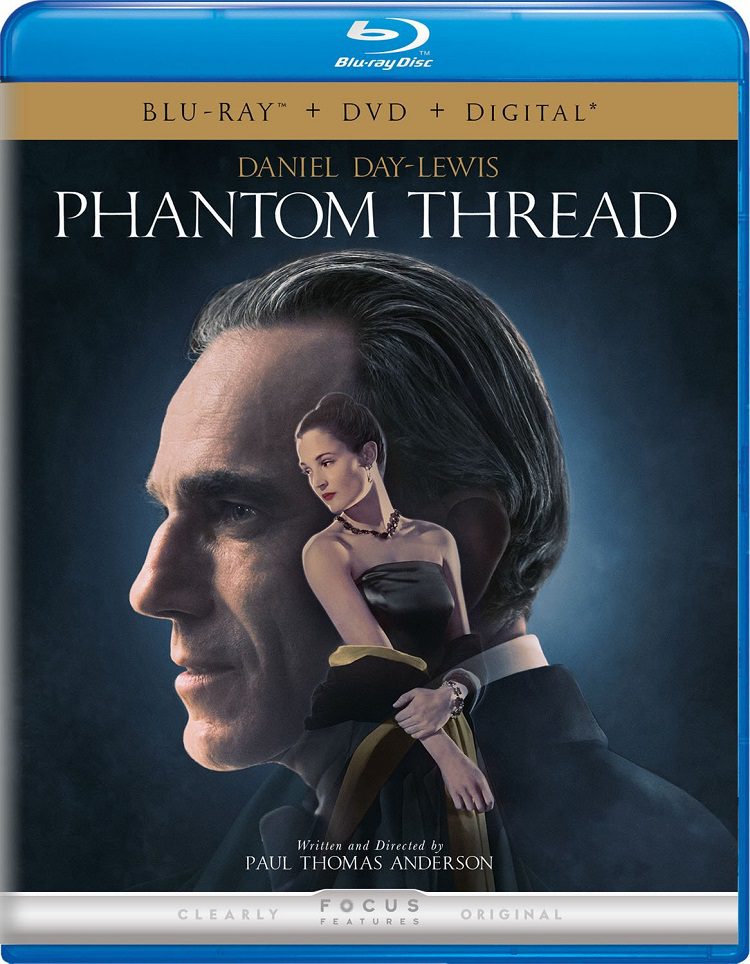
In 2017, Daniel Day-Lewis announced that he would be retiring from acting – which makes Phantom Thread, the eighth film from Paul Thomas Anderson, his final performance. Although Lewis has not graced the silver screen as often as many other actors do, the times he did have certainly been amongst the most memorable. Save for a few misses (Nine, for example), Lewis always brought an extreme amount of dedication and talent to each role. It’s helped him land three Oscar wins, along with three other nominations, and countless acclaim from multiple organizations. Phantom Thread is no different. It’s a tremendous achievement, and, if this is truly Lewis’ last film, it’s one heck of a way to call it a career.
Taking place in 1950s post-war London, Lewis plays Reynolds Woodcock, a dressmaker whose workaholic lifestyle has driven him to be what he calls a “confirmed bachelor.” He’s obsessive over every detail of each dress he makes. He hates being interrupted while working, and, if it does happen, he gets angered. It doesn’t matter if it’s his sister and business partner (Lesley Manville) or one of his many employees. He mustn’t be disturbed while he’s crafting a new idea for a dress. By now, everyone associated with him knows this. They may not like it entirely, but they have learned to live with it.
At this point, Reynolds’ method has proven to be rather successful, and his business, The House of Woodcock, is one of the most established dress shops in London. Reynolds’ love for his work, and the women with whom he surrounds himself, make him feel as though he doesn’t need to be married in order to be happy. Enter Alma (Vicky Krieps), a waitress at a nearby restaurant. It’s almost love at first sight for Reynolds, as he invites her to breakfast after she makes it for him. Soon, Alma and Reynolds become romantically involved, and Reynolds discovers that his lifestyle he’s had for so many years is now being intruded by love for another person.
Phantom Thread is a great portrayal of someone who is obsessive compulsive with the way they do things, and how even the tiniest disturbance can ruin their day. In the case of Reynolds, when Alma is buttering her bread, he complains that she’s doing it too loudly. The noises she makes when preparing breakfast are too much for him, and it causes him to lose focus. When she tries to talk to him while he’s working on something, it outrages him. Lewis perfectly captures the outrage of someone who completely immerses himself in his work and doesn’t put much focus on anything else around him, even the woman with whom he wants to share his life.
In some cases, the way in which Reynolds lashes out at Alma could be seen as toxic, and those types of relationships aren’t easy to experience in any way. But Anderson crafts Phantom Thread to be more like a romantic comedy, and a very dark one at that. The dialogue is sharply written, and the screenplay is laced with plenty of dry humor that is unexpected but also incredible to hear.
The two lead women in Phantom Thread don’t give into Reynolds’ controlling methods, and are able to stand up to him when he gets out of control. Anderson gives them plenty to work with and doesn’t make them weak characters. Manville, especially, is wonderful to watch play his sister.
I missed Phantom Thread when it played in theaters, but after watching it on Blu-ray, I really wish I caught it on a big screen. The cinematography is breathtaking, and the costume design is radiating that would look even more gorgeous in the theater. Jonny Greenwood’s score is also beautiful to hear play throughout. I feel the theatrical experience would have been more immersive and more of a unique experience, but I’m still glad that I finally caught up with this movie.
The Blu-ray comes with only a few special features. One is a compilation of behind-the-scenes photographs set to demo versions of Greenwood’s wonderful score. Another shows some camera tests and the different types of film stock Anderson used for capturing the movie’s wonderful imagery. “For the Hungry Boy” shows off some of the deleted scenes from the movie with Greenwood’s score accompanying them. The last and most interesting is a two-minute feature called “House of Woodcock,” which plays like a fashion show and has voiceover narration describing the dress each woman is wearing.
Phantom Thread is a terrific character study, loaded with excellent performances from all involved. Anderson’s direction might come off as a little too languid for some, but for those willing to experience a film about someone’s obsession taking over his life, it’s definitely worth it.